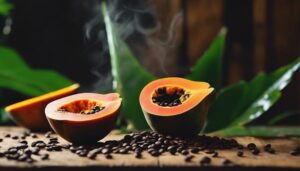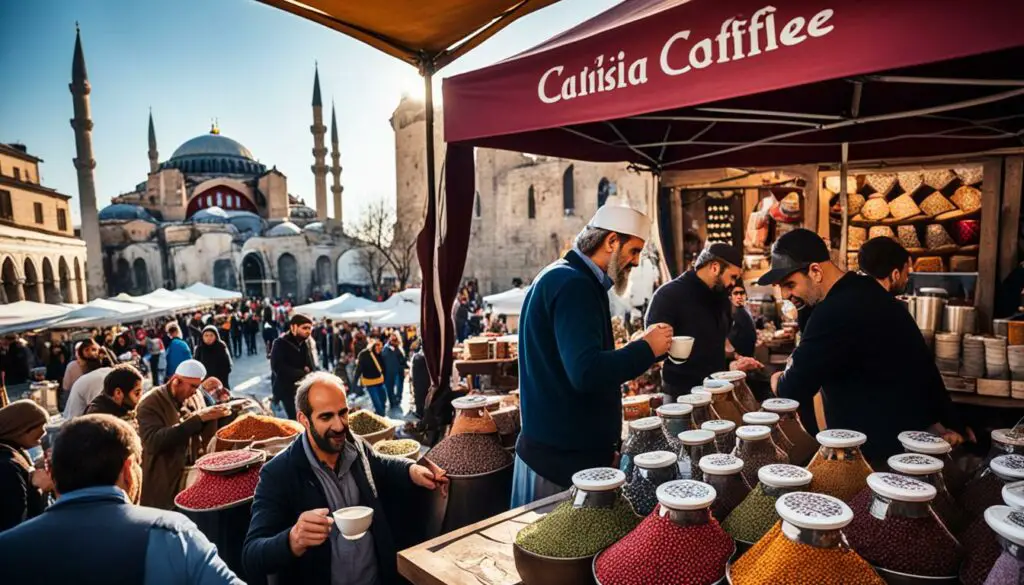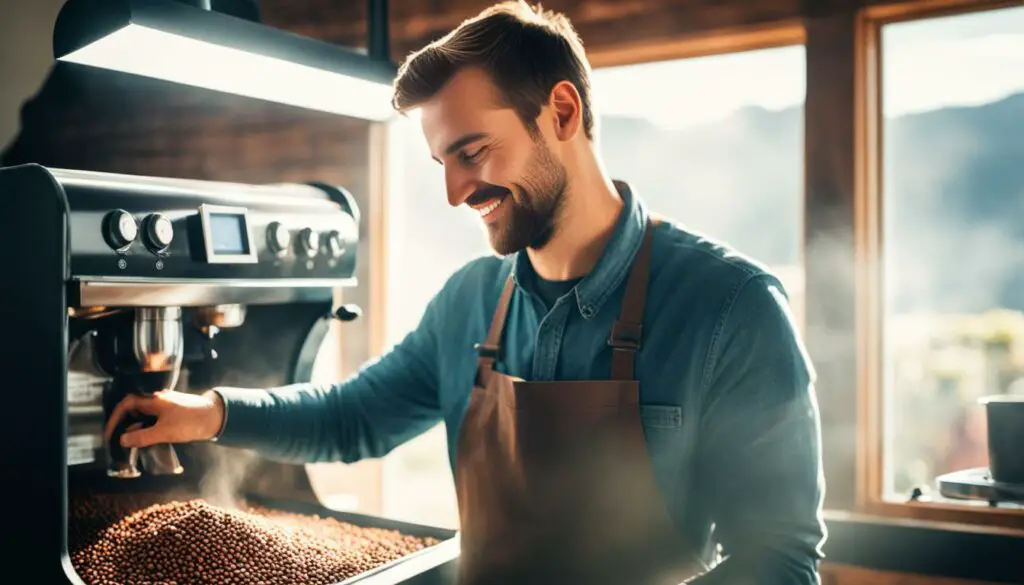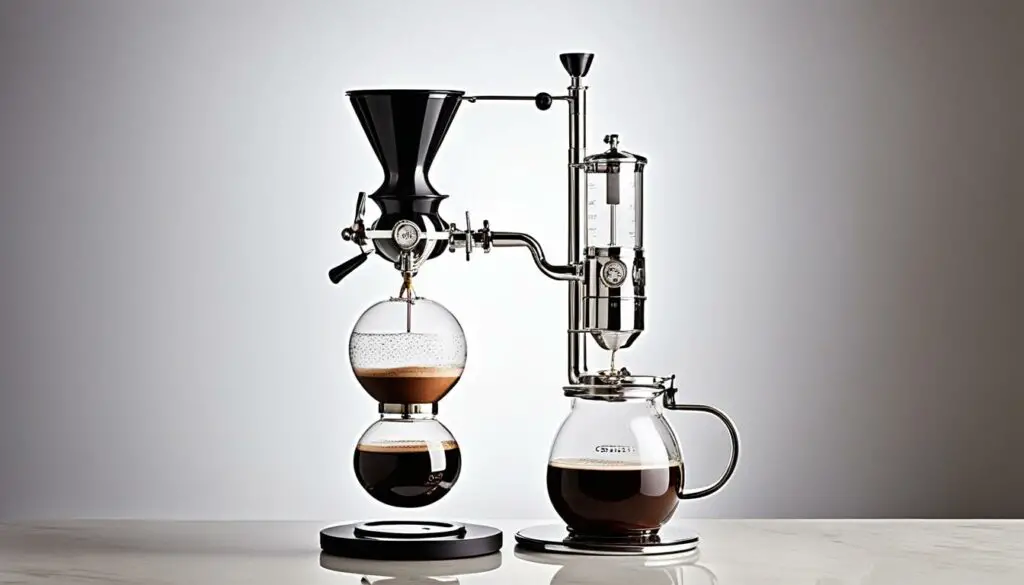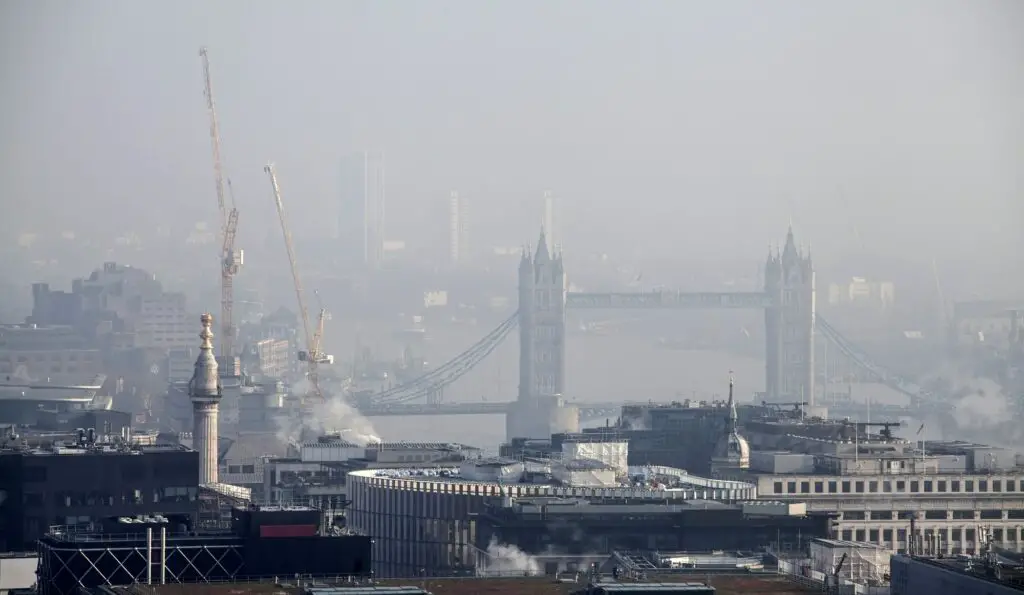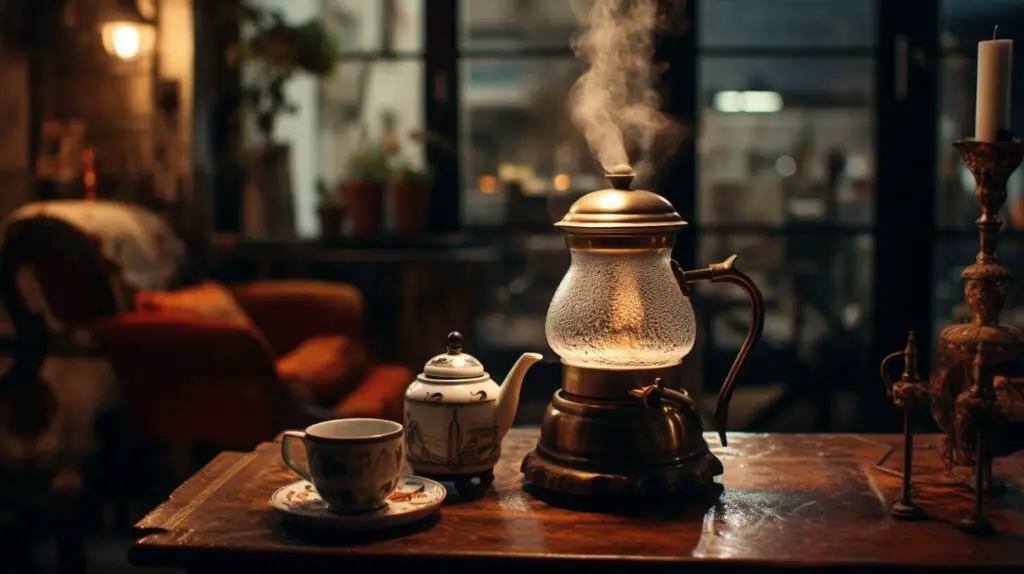Picture this: it’s early morning, and you’re standing in your kitchen, eagerly anticipating that first sip of perfectly brewed coffee. You reach for your favorite bag of freshly roasted coffee beans, carefully measure out the right amount, and prepare your trusty coffee maker. But wait, before you hit that start button, have you ever wondered about the optimal water temperature for brewing coffee?
Like many coffee enthusiasts, I’ve spent countless hours experimenting with different brewing techniques to unlock the full potential of my coffee beans. And let me tell you, the water temperature is a game-changer. It can mean the difference between a lackluster cup of coffee and a flavor explosion that tantalizes your taste buds.
But finding that perfect water temperature isn’t as simple as turning on the kettle and pouring it over your coffee grounds. It requires a bit of knowledge and understanding of the ideal coffee extraction temperature to achieve the best flavor and aroma.
In this article, we’ll dive deep into the world of water temperature and its impact on coffee brewing. We’ll explore the chemistry behind the brew, discuss the importance of water temperature, and identify the best water temperature range for achieving the most delicious cup of coffee possible.
So, grab your favorite mug, sit back, and get ready to embark on a coffee brewing journey where temperature plays a starring role. Let’s find out together what the best water temperature for brewing coffee truly is.
Understanding the Importance of Water Temperature in Coffee Brewing
When it comes to brewing the perfect cup of coffee, the temperature of the water plays a crucial role. The right water temperature can significantly impact the taste, aroma, and overall quality of your coffee. In this section, we will explore why water temperature matters for coffee, how it influences the extraction process, and the chemistry behind this relationship.
Why the Right Water Temperature Matters for Coffee
The water temperature used during the brewing process directly affects the extraction of flavors from the coffee grounds. If the water is too hot, it can result in over-extraction, causing the coffee to taste bitter, burnt, and unpleasant. On the other hand, if the water is too cold, under-extraction occurs, leading to a weak and flavorless brew.
By using the optimal water temperature, you can achieve a well-balanced and flavorful cup of coffee. The right water temperature allows for the extraction of desirable compounds, such as oils and acids, while minimizing the extraction of undesirable components that contribute to bitterness.
How Water Temperature Influences Coffee Extraction
The extraction of coffee flavors is a delicate process that is influenced by several factors, including water temperature. Hot water helps dissolve and extract flavors from the coffee grounds more efficiently. As water temperature increases, the rate of extraction also increases, resulting in a more intense and robust brew.
However, different compounds in coffee extract at different temperatures. For example, higher temperatures extract more acids, giving the coffee a brighter and tangier flavor profile. Lower temperatures, on the other hand, extract more sweetness and body. Finding the right balance is essential to achieve the desired taste.
The Chemistry of Coffee and Water Temperature
The interaction between coffee and water is a complex chemical process. Water acts as a solvent, dissolving and extracting various compounds from the coffee grounds. Temperature plays a critical role in this process.
Heat increases the kinetic energy of water molecules, allowing them to interact more effectively with the coffee grounds. This increased interaction facilitates the extraction of desirable compounds, such as caffeine, oils, and flavor molecules. Additionally, heat can accelerate chemical reactions that contribute to the Maillard browning process, responsible for the development of rich and complex flavors.
Understanding the importance of water temperature in coffee brewing is key to achieving the perfect cup. In the next section, we will delve into how to identify the best water temperature for brewing coffee based on different factors and brewing methods.
Identifying the Best Water Temperature for Coffee Brewing
When it comes to brewing coffee, finding the optimal water temperature is crucial for extracting the best flavors from your beans. The water temperature affects the extraction process, influencing the taste, aroma, and overall quality of your coffee. But how do you determine the best water temperature for brewing coffee? Let’s explore some factors to consider.
1. Experimentation: One way to identify the ideal water temperature is through experimentation. Start by trying different temperatures within the recommended range and take note of the flavors and characteristics that emerge. This trial-and-error approach allows you to fine-tune your brewing process and discover the temperature that brings out the best in your coffee.
2. Coffee Roast Level: Different roast levels require different water temperatures for optimal extraction. Lighter roasts generally benefit from lower temperatures, around 195°F (90°C), to preserve their delicate flavors. On the other hand, darker roasts often require higher temperatures, around 205°F (96°C), to unlock their bolder, caramelized notes.
3. Brew Method: Each brewing method has its own recommended water temperature range. For example, pour over methods like V60 or Chemex typically call for water between 195°F (90°C) and 205°F (96°C) to achieve a balanced extraction. French press, on the other hand, benefits from slightly lower temperatures, around 200°F (93°C), to minimize bitterness.
4. Coffee Origin: The origin of your coffee beans can also influence the optimal water temperature. Some coffee regions, like Ethiopia, produce beans that tend to be more delicate and floral. Lowering the water temperature to around 190°F (88°C) can help preserve these nuanced flavors. Conversely, coffees from Brazil or Indonesia, known for their full-bodied profiles, often benefit from higher temperatures, around 205°F (96°C), to enhance richness.
5. Taste Preference: Ultimately, the best water temperature for brewing coffee depends on your personal taste preferences. If you enjoy brighter, more acidic coffees, you may prefer slightly lower temperatures. If you prefer a more robust and intense cup, higher temperatures might be your preference. Experimenting and adjusting the temperature based on your desired flavors can help you achieve the perfect brew.
Remember, the key is to find a water temperature range that consistently produces a satisfying cup of coffee for your palate. By considering factors such as experimentation, coffee roast level, brew method, coffee origin, and personal taste preferences, you can identify the best water temperature for your coffee brewing endeavors.
Factors That Affect Coffee Brewing Water Temperature
Several factors can influence the water temperature during the coffee brewing process. Understanding these factors can help avid coffee enthusiasts achieve the perfect extraction and flavor in their cup of joe.
Roast Degree and Water Temperature Interplay
The roast degree of coffee beans can impact the optimal water temperature for brewing. Lighter roasts often require higher water temperatures to fully extract the delicate flavors, while darker roasts may benefit from slightly lower temperatures to avoid over-extraction and bitterness. Finding the right balance between roast degree and water temperature is crucial in achieving the desired taste profile.
Brew Methods and Their Ideal Temperatures
Each brew method has its ideal water temperature range, ensuring the best extraction and flavor. Here are some examples:
- French Press: The ideal water temperature for the French Press method ranges between 195°F to 205°F (90°C to 96°C). This temperature range allows for a full-bodied and robust brew.
- Pour Over: For pour-over enthusiasts, a water temperature of around 200°F (93°C) is commonly recommended. This temperature brings out the bright and nuanced flavors in the coffee.
- Espresso: The water temperature for espresso extraction is typically higher, ranging from 195°F to 205°F (90°C to 96°C). This temperature range helps to extract the intense flavors and crema characteristic of espresso.
Geographical Elevation and Boiling Points
Geographical elevation plays a role in determining the boiling point of water, which, in turn, affects the brewing temperature. At higher elevations, where atmospheric pressure is lower, water boils at a lower temperature. This means that coffee brewers at higher altitudes may need to adjust their water temperature settings accordingly to ensure optimal extraction.
By considering factors such as roast degree, brew method, and geographical elevation, coffee enthusiasts can experiment and fine-tune their brewing process to achieve the perfect water temperature for their preferred coffee flavor.
The Ideal Temperature for Different Coffee Brewing Methods
When it comes to brewing coffee, water temperature plays a crucial role in achieving the perfect cup. Each brewing method requires a specific water temperature to extract the optimal flavors from the coffee beans. In this section, we’ll explore the ideal water temperature for various popular brewing methods, including espresso, pour-over, French press, and AeroPress.
Optimal Water Temperature for Espresso
Espresso, known for its concentrated and bold flavors, requires a precise water temperature to extract the rich essences from the finely ground coffee. The ideal water temperature for espresso brewing is generally around 195°F to 205°F (90°C to 96°C). This temperature range ensures proper extraction without over or under extracting the coffee, resulting in a well-balanced and flavorful shot.
Perfect Brewing Temperature for Pour Over
Pour over brewing is a popular method that allows for a clean and nuanced coffee experience. To achieve the best flavors with pour over, the water temperature should be slightly lower than that of espresso. Aim for a temperature range of 195°F to 205°F (90°C to 96°C). This range allows for optimal extraction while preserving the delicate flavors of the coffee, resulting in a clean and vibrant cup.
Adjusting Water Temperature for French Press Mastery
French press brewing offers a full-bodied and robust coffee experience. The immersion method of brewing requires a higher water temperature than other methods. Aim for a temperature range of 200°F to 205°F (93°C to 96°C) to compensate for heat loss during the brewing process. This higher temperature helps to extract the rich flavors and oils from the coffee beans, resulting in a bold and flavorful brew.
The Unique Case of the AeroPress
The AeroPress, known for its versatility and ease of use, has its own ideal water temperature range. For a balanced and flavorful cup with the AeroPress, aim for a temperature range of 175°F to 185°F (79°C to 85°C). This lower temperature allows for a gentler extraction, bringing out the vibrant and nuanced flavors of the coffee.
| Brewing Method | Ideal Water Temperature |
|---|---|
| Espresso | 195°F to 205°F (90°C to 96°C) |
| Pour Over | 195°F to 205°F (90°C to 96°C) |
| French Press | 200°F to 205°F (93°C to 96°C) |
| AeroPress | 175°F to 185°F (79°C to 85°C) |
Best Practices for Achieving Precise Water Temperature for Perfect Coffee
Now that you understand the importance of water temperature in coffee brewing and have identified the best temperature for your preferred brewing method, it’s time to explore some best practices for achieving precise water temperature. These tips and techniques will help you maintain optimal brewing temperature consistently and enhance the flavor of your coffee.
To ensure you’re brewing at the right temperature, follow these guidelines:
- Use a thermometer: Invest in a reliable digital thermometer to accurately measure the water temperature. This will eliminate any guesswork and allow you to achieve precise results.
- Preheat your equipment: Before brewing, preheat your coffee maker, kettle, or any other brewing equipment to avoid heat loss and maintain consistent water temperature throughout the process.
- Manage heat source: If you’re using a stovetop kettle, adjust the heat source to prevent over-boiling or under-heating the water. Maintaining a steady heat source is crucial for achieving the desired temperature.
- Experiment and adjust: Different coffee beans and brewing methods may require slight temperature adjustments. Don’t be afraid to experiment with small changes in water temperature to find the sweet spot for your specific preferences.
- Consider water quality: The quality of water used in coffee brewing can affect the taste. Use filtered or purified water to eliminate any impurities and enhance the overall flavor profile of your coffee.
By following these best practices, you’ll be able to consistently brew coffee at the optimal temperature, unlocking the full potential of your beans and enjoying a delicious and satisfying cup every time.
| Best Practices for Achieving Precise Water Temperature |
|---|
| Use a thermometer to measure water temperature accurately. |
| Preheat brewing equipment to maintain consistent temperature. |
| Manage heat source to prevent over-boiling or under-heating. |
| Experiment and adjust to find the perfect temperature for your preferences. |
| Consider using filtered or purified water for better taste. |
Advanced Tips: Experimenting with Water Temperature Variations
Adjusting the water temperature during coffee brewing can be a fascinating way to explore and fine-tune the flavors in your cup. By experimenting with different water temperatures, you can unlock new dimensions of taste and aroma, uncovering the full potential of your coffee beans. From subtle nuances to bold and vibrant flavors, temperature variations offer endless possibilities for customization.
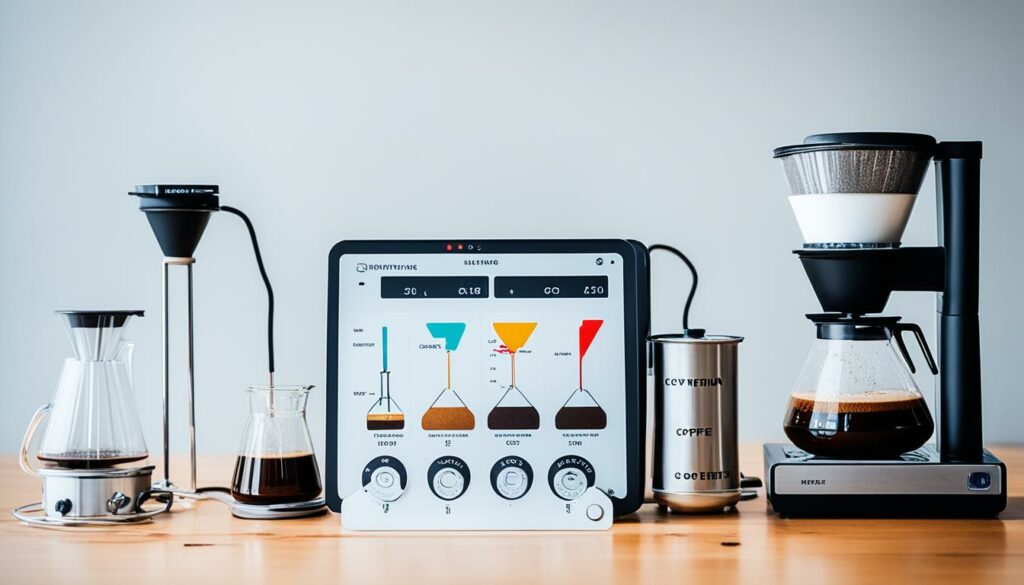
Using Water Temperature to Fine-Tune Flavors
The temperature of the water used in coffee brewing plays a crucial role in influencing the flavors extracted from the beans. Higher temperatures tend to extract more acidity and bitterness, while lower temperatures result in a smoother and sweeter cup. By adjusting the water temperature, you can highlight specific flavor profiles, balance the intensity, and create a personalized coffee experience tailored to your preferences.
How Professional Baristas Utilize Temperature
Professional baristas understand the impact of water temperature on coffee extraction and employ various techniques to harness its potential. They carefully adjust the temperature to enhance the characteristics of different coffee beans and brewing methods. For example, they may opt for higher temperatures when brewing light-roast coffees to accentuate their bright and delicate notes, while choosing lower temperatures to bring out the natural sweetness in darker roasts.
Learning from the World AeroPress Championship Recipes
The World AeroPress Championship is an annual competition that highlights the versatility and creativity of this popular brewing method. The championship’s recipes provide valuable insights into the use of water temperature to achieve exceptional results. Baristas from all over the world experiment with temperature variations to optimize the flavors extracted from the AeroPress, resulting in unique and innovative recipes that push the boundaries of what’s possible.
By studying these championship recipes and applying their techniques, you can gain inspiration and knowledge to elevate your own coffee brewing. Discover the art of balancing water temperature and other variables to unlock new depths of flavor and take your coffee experience to the next level.
Conclusion
Understanding the impact of water temperature on coffee brewing is key to achieving the perfect cup of joe. The optimal water temperature is crucial in extracting the desired flavors and aromas from the coffee beans.
Through our exploration, we have learned that the best water temperature for brewing coffee ranges between 195°F and 205°F (90°C and 96°C). This temperature range ensures optimum extraction while avoiding over-extraction or under-extraction, which can lead to bitter or weak-tasting coffee.
Factors such as roast degree, brew methods, and geographical elevation can influence the ideal water temperature. It is important to adjust the temperature accordingly to match the specific brewing method and coffee bean characteristics.
By following best practices for achieving precise water temperature and experimenting with variations, you can unlock new dimensions of flavor in your coffee. Whether you are a coffee enthusiast or a professional barista, understanding and controlling water temperature will elevate your brewing skills and enhance your coffee experience.


